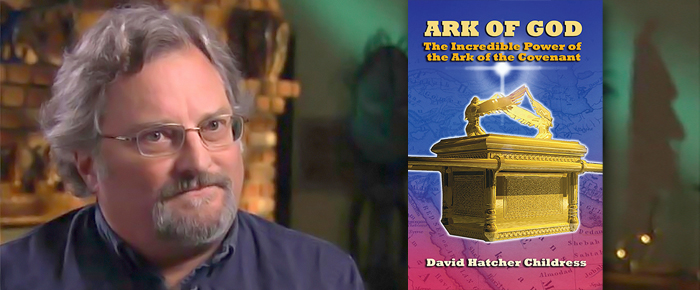
By Heidi Simmons
—–
“Ark of Gold”
by David Hatcher Childress
Nonfiction
—–
With the upcoming “Contact in the Desert” in Joshua Tree this June 3-6, it’s appropriate to high-light a good friend. This event is one of the largest UFO conferences in the country. Author, explorer and television personality David Hatcher Childress (History Channel’s “Ancient Aliens”) is one of the keynote speakers. His latest book Ark of God: The Incredible Power of the Ark of the Covenant (Adventures Unlimited Press, 420 pages) is his 18th book and like his others, it is filled with travel adventure, compelling information and historical mysterious.
Childress’ most beloved collection of books may be his travel series “Lost Cities and Ancient Mysteries” where he personal explores the globe in search of answers that inevitably lead to bigger unsolved mysteries and even more intriguing questions.
All Childress’ books are filled with carefully curated diagrams, illustrations and photographs. He creates a narrative that incorporates archeology, history, mythology, legends, religions and superstitions to better comprehend and speculate about our planet and its human inhabitants – past, present and future.
In Ark of God: The Incredible Power of the Ark of the Covenant, Childress takes a fascinating and detailed look at the famous biblical object constructed by Moses based on God’s orders. He begins the book with an article that claims the Ark of the Covenant was stolen from its hiding place in Ethiopia. Having just visited the sight, he knows the story is a hoax. Childress is moved to take another look at this artifact and thoroughly examines the stories and the powers of the Ark of the Covenant.
My favorite chapter explores the possibility that the Ark was like an ion lithium or dry-cell battery. Based on technology from a pervious high-tech civilization, which existed before being destroyed by a cataclysmic event, the Ark could be evidence that it served as some kind of electrical conduit.
Not too long ago, this discussion sounded crazy and far-fetched, but today, the information makes much more sense as we now live in a wireless society, are generating electricity on our rooftops and finding new ways to store energy.
Childress goes into detail about ancient power devices that seem to have existed in Egypt and Lebanon. “Djed” columns that are seen in hieroglyphs are thought to be insulators and served as multi-purpose conductors. These columns often have globes or orbs that seem to radiate energy or light. What’s weird is the “djed” columns appear at other archeological sights around the world. Are they’re like Tesla coils?
The author believes that there is no other artifact in the world more important than the Ark of the Covenant. (What about Noah’s Ark?) Childress tells the colorful stories of the possible locations of the Ark that include Zimbabwe, Ireland and Scotland, France, Mount Nebo and under Israel’s Wailing Wall. He talks about the Nazi’s interest in the Ark and speculates that some government may have it stored away.
If you are thinking about the movie Raiders of the Lost Ark, you should be. Childress is often referred to as the “real” Indian Jones. (I think Childress is friendlier, more curious and much more open-minded than the whip-wielding movie hero.) Clearly, this is a subject that fascinates Childress and he enjoys writing about it.
Ark of Gold reads easily and is very entertaining. It helps if you have some biblical knowledge as he frequently makes references to the good book. But he explains things well always connecting the dots and the narrative flows naturally.
In his conclusion, Childress addresses what the Ark may mean to humankind today. He refers to the Bible and the “New Covenant” writing: “People will come to know for themselves the truth of spiritual matters without outward inspiration and the use of ‘miraculous’ signs.”
Finishing with a direct quote from Hebrews 8:8-12, Childress seems to be delivering a message that God still exists and so does the covenant with or without the Ark. God loves human beings and forgives us our iniquities and sins. What good news!
Have a great Easter. See you at “Contact in the Desert.”












































